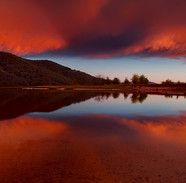Australian Paradoxes
In my home country, Australia, there’s a famous poem by Dorothea Mackellar, called My Country. Many of us learn it at primary school. The most well-known verse goes like this:
I love a sunburnt country,
A land of sweeping plains,
Of ragged mountain ranges,
Of droughts and flooding rains
I love her far horizons
I love her jewel-sea,
Her beauty and her terror
The wide brown land for me!
The thing Mackellar captures—so we’re told, when we learn the rhyming stanzas—is the contrasts of this wide brown land of ours. Our sunburnt country is a land of contrasts. True enough. But as we stand at the start of a new decade, still early in a new millennium, it starts to seem like more than this. When contrasts become so severe that they’re incomprehensible, they’re not really “contrasts” anymore. They’re paradoxes. And as 2020 rolls on, Australia has paradox in spades.
We’re a landmass south of Asia that often still thinks it’s in Europe. We’re a country in the hemispheric South, but one that has mined its way into the economic North. We’re a culture that dreams of “the outback,” but lives as far from it as we can get, generally clustered in cities on our coasts. We’re a proud multicultural democracy that seems quite comfortable overlooking authoritarian interventions, as long as they’re being used to prop up dead industries or suppress ecological protests. Distrust and contempt often seem to be growing; understanding and humility, shrinking. If these things continue too long, the sunburnt country will end up burning itself to the ground.
We remain one of the world’s largest exporters of coal: even in the wake of our most recent fire season, now known as “Black Summer,” which has burned almost 19 million hectares, destroyed almost 6,000 buildings, and killed an estimated one billion animals. We keep electing “conservative” governments that do not, in fact, conserve, preferring instead to destroy in the service of fleeting and reactionary pleasures. We’re currently enjoying the boon of our first-ever Pentecostal prime minister—although, it should be noted, it’s hard to know how long this boon will last, because Australian political parties like to knife their leaders in the back every few years. Our Father Who Art in Parliament, Scott Morrison, is just a regular bloke. He enjoys long walks on our nation’s pristine beaches, bringing lumps of coal to his Lower House, and shaking hands with bushfire victims while he waits for Revelation(s).
There’s another line that students learn a bit later in their schooling, which will be more familiar to American readers. A decade or two after Mackellar wrote My Country, F. Scott Fitzgerald wrote his most famous novel. His target was 1920s New York. But the last line of The Great Gatsby might just as well be describing Australia in the 2020s. “So we beat on, boats against the current, borne back ceaselessly into the past.” As the real 1900s fade—with their Stolen Generations, their Maralinga nuclear tests, and their White Australia Policies—we work harder and harder to find an imaginary past that might supplant them. And we link this past to the land, or certain ideas about land, so we can use it to support a very particular, and very anti-ecological, vision of the future. In this parallel past, men were men, boys could be boys, and all of them could be hard-drinking, footy-kicking ANZAC legends. We were a stoic people of the bush, with no time for whiners, and we didn’t have any mincing, postmodern leftists, with their gender-bending, black armband views of history, intent on destroying the “traditional values” that make Australia home. Those Aboriginals and other minorities knew their place; and the original “Silent Australians”—those classic battlers—still had the kind of “f*** the Poms,” larrikin good sense to know that having all the coal is the way to solve all the problems.
Mackellar’s poem is called My Country. But Australia doesn’t feel like our country, anymore. It doesn’t feel welcoming to those who fear for the future of the land, and of our ability to live together upon it. It feels like the country of others, clinging to power, soon to be dead, in alliance with fictions who never truly existed. It feels like a place of morbidly obese resource barons, shell corporations, and fly-in-fly-out jobs. It feels like a place animated by short-termism, cynicism, and contempt: for difficulty, for difference, and for the limits of country themselves.
Herein lies the strangest contrast of all. While we’re careening toward a future so few of us chose and even fewer of us want to come to pass, we have so much we might draw upon to make things different. Our Indigenous cultures are the oldest continuing cultural traditions on Earth. They are active in imagining and re-imagining sustainable connections to what they call Country, which doesn’t just mean “standing reserve,” but something closer to interrelationship, living negotiation. We have non-Indigenous writers, like Val Plumwood, who’ve made some of the world’s greatest contributions to ecological and feminist philosophy. We have the wind and waves to power offshore turbines, and the sun to power solar farms. We have the echoes of humility and egalitarianism that we could repurpose to check our confusion and voice our concern. And we have the sorts of communities, at least in places, that strive for careful, communal, and concrete responses to our problems. As the Earth enters the Anthropocene—the age of humans—Australia can’t afford to be a place stuck in the past, or worse, the imaginary past. We must be a place that cares for all its lands and steers its boats not backward, but resolutely forward. Mackellar wrote of loving the beauty and her terror of Australia: contrasts, paradoxes, and all. If we’re to pay heed to the spirit of her love song and work for beauty over terror it’s time to listen to that poetry again.







